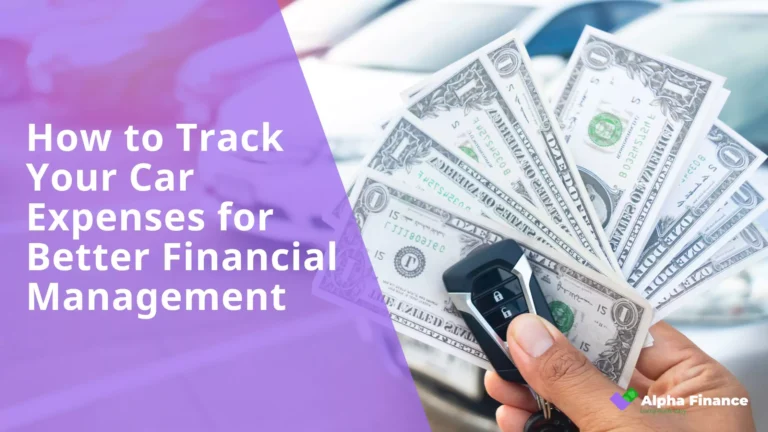Accurate budgeting and financial planning, especially when considering car financing, are essential for responsible car ownership. A crucial component of this is diligently tracking your car expenses. Many car owners focus solely on monthly loan payments and fuel costs, overlooking the myriad of other expenses that contribute to the true cost of driving. By meticulously tracking all car-related expenditures, you can unveil hidden costs, identify areas for savings, and gain a clear understanding of your vehicle’s impact on your overall finances. This article provides practical methods for tracking car expenses, empowering you to improve your financial management and drive towards greater financial clarity, particularly when navigating the complexities of car financing.
Methods for Tracking Car Expenses
-
Spreadsheets (Excel/Google Sheets):
- Spreadsheets offer a versatile and customisable approach to tracking car expenses. You can create categories for fuel, maintenance, insurance, registration, tolls, parking, and any other relevant expenses.
- Input your expenses regularly, including dates, amounts, and descriptions.
- Utilise formulas to calculate totals, averages, and other relevant metrics.
- Create charts and graphs to visualise your spending patterns and identify trends.
- Google Sheets allows for cloud based usage, and sharing.
-
Mobile Apps:
- Dedicated car expense tracking apps provide a convenient and user-friendly way to manage your expenses.
- Many apps offer features like automatic mileage tracking, fuel log, maintenance reminders, and expense categorisation.
- Consider popular apps like Fuelio (for fuel tracking), Drivvo (for comprehensive car management), or MileIQ (for business mileage tracking).
- Many apps also allow for receipt storage via photo.
-
Paper Logs:
- For those who prefer a simple and tangible method, a notebook or logbook can be used to manually track car expenses.
- Create clear categories for different expense types and consistently record your expenses.
- Paper logs are portable and don’t require any technological expertise.
-
Receipt Organisation:
- Keeping all car-related receipts is crucial for accurate tracking and potential tax deductions.
- Use folders or envelopes to organise your receipts by category.
- Consider using digital storage solutions, such as scanning apps, to create digital copies of your receipts.
- Scanning apps such as Adobe Scan, or Google Drive, allow for easy digital storage, and some Optical character recognition.
Key Categories to Track
To gain a comprehensive understanding of your car expenses, it’s crucial to track specific categories meticulously.
-
Fuel:
- Track fuel consumption by recording mileage and fuel purchases.
- Note the date, litres purchased, cost per litre, and total cost of each fuel purchase.
- This data allows you to monitor fuel efficiency and identify any fluctuations in fuel costs.
-
Maintenance and Repairs:
- Track all maintenance and repair expenses, including oil changes, tire rotations, brake repairs, and other services.
- Record the date, description of the service, and the cost.
- This data helps you identify potential maintenance issues and budget for future repairs.
-
Insurance:
- Track insurance premiums and renewal dates.
- Note the policy number, premium amount, payment frequency, and renewal date.
- Regularly compare insurance quotes from different providers to ensure you’re getting the best rates.
-
Registration and Taxes:
- Track registration fees and vehicle taxes, including annual or periodic renewal costs.
- Note the renewal dates to avoid late fees.
- Knowing these dates, allows you to plan for the expense.
-
Tolls and Parking:
- If applicable, track toll road costs and parking fees.
- Note the date, location, and amount of each toll or parking fee.
- These costs can add up over time, so tracking them helps you identify potential savings.
-
Cleaning and Detailing:
- Track the costs of car washes, detailing, and cleaning supplies.
- This will allow you to see the true cost of keeping your car clean.
Analysing Your Car Expense Data
Analysing your car expense data allows you to gain valuable insights into your spending patterns and make informed financial decisions.
-
Identify Spending Patterns:
- Analyse your data to identify trends and patterns in your spending.
- Determine which categories consume the most significant portion of your car expenses.
- Identify areas where you can potentially reduce costs, such as fuel consumption or maintenance.
-
Calculate Cost Per Kilometer/Mile:
- Calculate the cost per kilometre/mile to assess your fuel efficiency.
- Compare your fuel efficiency over time to identify any changes or improvements.
- This is very useful for budgeting long trips.
-
Create Visualisations:
- Use charts and graphs to visualise your spending data.
- Identify spending spikes and trends, such as seasonal fluctuations in fuel costs or unexpected repair expenses.
- Spreadsheet programs, and many of the apps mentioned above, have this functionality.
-
Set Budget Goals:
- Use your expense data to set realistic budget goals for each category.
- Track your progress towards your budget goals and make adjustments as needed.
- This will allow you to see how well you are adhering to your budget.
Tips for Consistent Tracking
Consistent tracking is key to reaping the benefits of car expense management. Here are some tips to help you stay on track:
-
Regular Updates:
- Make it a habit to update your expense records regularly.
- Set aside a specific time each week or month to input your expenses.
- Consistency prevents data overload and ensures accuracy.
-
Use Automation:
- Take advantage of apps with automatic tracking features.
- Many apps allow you to link your bank accounts or credit cards, automatically recording transactions.
- This saves time and reduces the risk of missing expenses.
-
Categorise Expenses Accurately:
- Ensure you categorise your expenses accurately for meaningful analysis.
- Create clear and consistent categories to avoid confusion.
- This will make it easier to see where your money is going.
-
Review and Adjust:
- Regularly review your expense data and adjust your tracking methods as needed.
- Adapt to changes in your driving habits, vehicle maintenance needs, or fuel prices.
- This will keep your tracking relevant, and help you find new ways to reduce costs.
Benefits of Effective Car Expense Tracking
Effective car expense tracking offers numerous benefits, empowering you to take control of your finances and make informed decisions.
-
Improved Budgeting:
- Tracking your expenses leads to more accurate and effective budgeting.
- You can allocate funds for car-related expenses based on real data, rather than estimates.
- This will help you avoid unexpected expenses.
-
Reduced Overspending:
- Tracking helps you identify and reduce unnecessary spending.
- You’ll be able to see where you’re overspending on fuel, maintenance, or other expenses.
- This will result in tangible savings over time.
-
Better Financial Planning:
- Tracking provides valuable insights for long-term financial planning.
- You can plan for future car-related expenses, such as repairs or replacements.
- This will help you avoid financial surprises.
-
Increased Awareness:
- Tracking increases your overall financial awareness related to car ownership.
- You’ll gain a better understanding of the true cost of driving.
- This awareness empowers you to make informed financial decisions.
Conclusion
Tracking your car expenses is a pivotal step towards achieving financial control and clarity. By utilising methods such as spreadsheets, mobile apps, or paper logs, you can gain valuable insights into your spending patterns and identify areas for potential savings. Consistent tracking empowers you to make informed decisions about your car-related finances, leading to improved budgeting, reduced overspending, and better long-term financial planning. Embrace the power of data and take control of your car expenses today. Choose a tracking method that suits your lifestyle and begin monitoring your expenditures to drive towards a future of financial stability.
Alpha Finance: Your Road to Ownership
At Alpha Finance, we understand that car ownership is a significant financial undertaking. We’re committed to providing you with the tools and resources you need to navigate the car financing process with confidence. By diligently tracking your car expenses, as outlined in this guide, you can gain a deeper understanding of your financial obligations and make informed decisions that align with your budget. Alpha Finance offers competitive car loan solutions and personalised support to help you achieve your car ownership goals without compromising your financial well-being. Contact Alpha Finance today to explore your car financing options and embark on a journey towards informed and responsible car ownership.




